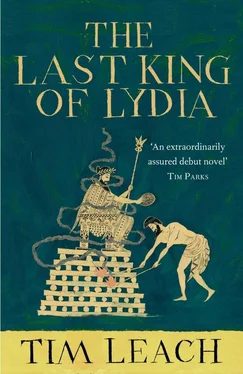Tim Leach - The Last King of Lydia
Здесь есть возможность читать онлайн «Tim Leach - The Last King of Lydia» весь текст электронной книги совершенно бесплатно (целиком полную версию без сокращений). В некоторых случаях можно слушать аудио, скачать через торрент в формате fb2 и присутствует краткое содержание. Год выпуска: 2013, ISBN: 2013, Издательство: Atlantic Books Ltd, Жанр: Исторические приключения, на английском языке. Описание произведения, (предисловие) а так же отзывы посетителей доступны на портале библиотеки ЛибКат.
- Название:The Last King of Lydia
- Автор:
- Издательство:Atlantic Books Ltd
- Жанр:
- Год:2013
- ISBN:9780857899200
- Рейтинг книги:5 / 5. Голосов: 1
-
Избранное:Добавить в избранное
- Отзывы:
-
Ваша оценка:
- 100
- 1
- 2
- 3
- 4
- 5
The Last King of Lydia: краткое содержание, описание и аннотация
Предлагаем к чтению аннотацию, описание, краткое содержание или предисловие (зависит от того, что написал сам автор книги «The Last King of Lydia»). Если вы не нашли необходимую информацию о книге — напишите в комментариях, мы постараемся отыскать её.
The Last King of Lydia — читать онлайн бесплатно полную книгу (весь текст) целиком
Ниже представлен текст книги, разбитый по страницам. Система сохранения места последней прочитанной страницы, позволяет с удобством читать онлайн бесплатно книгу «The Last King of Lydia», без необходимости каждый раз заново искать на чём Вы остановились. Поставьте закладку, и сможете в любой момент перейти на страницу, на которой закончили чтение.
Интервал:
Закладка:
‘I had heard there was a baker involved in this story. That was you?’
‘Yes.’
‘You used it to poison them instead, did you not?’
‘Yes. They were staying in the palace at the time, and it was simple enough for me to serve them with their own poison.’
‘Remind me not to make an enemy of you,’ Solon said. ‘They would have made you a rich man. Perhaps even a free man. Instead you became a murderer. Why do it?’
Isocrates hesitated, his hands pausing for a moment on the old man’s back. ‘I don’t know.’
‘I think you do.’
‘Croesus is an innocent,’ Isocrates said, after a moment. ‘And they were such schemers. It didn’t seem right, to murder an innocent man to put people like them into power. And those who use poison surely deserve to die by it. Is that a proverb?’
‘It should be. So, you are a baker, a poisoner, now the personal slave of the king. You have many talents, it seems.’
‘I like to think so.’
‘I am not sure he is worthy of you. I cannot tell you the number of courts that I have visited where the slaves had more wit than their masters. I have begun to think that perhaps our cities would be much improved if the masters and the slaves were to change places overnight.’
‘You do my master wrong.’
‘He asked me the most foolish question today. Sitting there with a look in his eyes like a shy boy in front of a beautiful girl. I thought he had some profound dilemma to present to me. A good philosophical puzzle, perhaps. Instead he asked me to name the happiest person I had ever met.’
‘And you didn’t say him?’
‘No. I told him it was Tellus. That vexed him.’
‘And who is Tellus?’
‘An Athenian, like any other.’ Solon smiled. ‘Your Croesus, he is a decent man, and not a bad king by all accounts. But he’s a fool.’
‘He’s no fool.’
‘Then what is he?’
Isocrates shrugged. ‘Inexperienced.’
‘Ah. There you have it. He hasn’t seen much of the world, has he? An innocent man. That’s why he thinks he’s happy.’ Solon paused, turning the thought over. ‘Thank you, Isocrates. You have given me the answer I was looking for.’
‘How do you mean?’
‘There was something in his character that I couldn’t quite understand. I am thinking of writing something, you know, on the characters of kings and of their closest slaves. The chapter on Croesus would have been incomplete without that little observation of yours.’
Isocrates finished his massage at the base of the other man’s back, stepped backwards, and bowed. Solon sat upright, stretched and muttered appreciatively.
‘My thanks to you,’ Solon said. ‘In return, I shall give you something.’
‘My duty is my reward.’
‘I doubt that’s true. I have no coin to give you, but perhaps you will accept a secret.’ And before the slave could respond, Solon leaned forward and spoke a few words in his ear.
Isocrates stepped back and looked at the other man warily. Solon smiled. ‘I know slaves have little use for other men’s secrets,’ he said. ‘My apologies.’ The old man yawned.
‘You are tired,’ the slave said. ‘I will leave you.’
‘Yes, I am tired. Sleep comes easily when you are as old as I am. Practice for what lies ahead.’ Solon rubbed at his face. ‘Thank you for your company, Isocrates. I don’t suppose I shall see you again. I doubt that your master will spare you during the rest of my stay here.’
‘You are right. Good luck with your writing.’
‘Oh, that.’ Solon waved a hand dismissively. ‘I will never finish it. I’ll die long before it is done, and if it is not finished by me it will have to be burned. There is nothing more dangerous than leaving a half-finished work behind when you die. Some fool will come along and finish it for you, and your legacy is tainted.’ He paused. ‘A shame, though. You would have warranted a most interesting chapter to yourself. Instead, you will be forgotten by history.’
‘The only slaves that are remembered are those who were foolish or treacherous, or died badly. To be forgotten is not so bad.’
Isocrates went to leave, but stopped at the doorway. Solon looked up at him. ‘Something else?’
The slave turned back. ‘I am curious. Why start your work, if you know you will never finish it?’
Solon paused. ‘I remember, a few years ago, at one court or another, listening to a boy recite a poem. It was quite beautiful. After he had finished, I asked him to teach it to me. Another man in the room looked at my grey hair — what is left of it — and asked me why I was bothering to learn the poem, old man that I was. I told him, “So that I may learn it and then die.”’ He shrugged. ‘What else is there to do?’
Isocrates kept his head low and his pace steady after he left the guest chamber. He looked at no one as he walked through the narrow corridors of the palace, and paused only to flatten himself against the wall when someone approached.
As he walked, he felt eyes pass over him briefly, then slip away just as quickly. He wondered whether any of those men and women, if asked about it an hour later, would say that they they had seen him at all. He doubted it. They would not be lying. They had simply trained themselves not to see him or any other slave, any more than one would notice a door or a well that one used every day. If any of them had noticed him, they would have assumed that he was running an errand for his king. None would have suspected that he might be running an errand for himself.
It took him some time to find whom he was looking for. There was no predicting what her movements would be, where she would be found or even if she could be found at all. Many times, he had squandered what free time he had travelling from one room in the palace to another, chasing phantoms through the corridors of Sardis. This time, he was fortunate. After only a short search, in a small courtyard at the gate of palace, he found Maia, the slave who watched the king’s second son.
As always, she was with her charge. He watched as the boy slowly paced around the dusty courtyard. The guards who stood near by were careful to stay away from him. Any other mute they would have laughed at and toyed with, and so, unable to mock a royal prince and not knowing what else to do with him, they tried to ignore him. They watched Maia instead.
She was not one of the beautiful slaves. Plain-faced and heavy-set, Maia had little to draw the wandering eye to her. When, on occasion, Isocrates was asked by another slave why he had chosen her as his wife, he would say, and only half in jest, ‘Because she’s patient.’
It was a quality that well suited her to her task as the boy’s guardian. For the most part, she left Gyges alone, staying just out of arm’s reach. Occasionally, judging his mood, she would move quickly to pick up something for him to play with. A loose reed, a cracked piece of pottery, a rag of cloth, whatever came to hand. He was known to reject any toys that were given to him, accepting only these improvised, adapted objects which he used for games that no one else could understand.
Isocrates watched them together, his wife and the boy, as they moved around the courtyard in a strange, broken dance, sometimes drawing close, but never touching. For a moment, he allowed himself to imagine that it was his son at play there, not the king’s.
Maia looked up for a moment from her charge, and saw her husband standing in the doorway. He smiled, opened his mouth to call to her, but her eyes warned against it. She made a slight gesture with her hand. He looked up, and saw, from a balcony, the king of Lydia looking down on the courtyard.
Croesus was watching Maia playing patiently with his son. Sometimes, a hint of a smile worked its way on his face, when Gyges acted like any other child, absorbed in his own secret games and invented world. Then the boy would turn away and hiss or moan, make the alien sounds that no other child made, and the king’s half-smile would twist in on itself — whether from pain or disgust, Isocrates could not tell. For the most part, the king’s face was unreadable. Perhaps he was trying to pretend to himself that he too was watching another man’s son.
Читать дальшеИнтервал:
Закладка:
Похожие книги на «The Last King of Lydia»
Представляем Вашему вниманию похожие книги на «The Last King of Lydia» списком для выбора. Мы отобрали схожую по названию и смыслу литературу в надежде предоставить читателям больше вариантов отыскать новые, интересные, ещё непрочитанные произведения.
Обсуждение, отзывы о книге «The Last King of Lydia» и просто собственные мнения читателей. Оставьте ваши комментарии, напишите, что Вы думаете о произведении, его смысле или главных героях. Укажите что конкретно понравилось, а что нет, и почему Вы так считаете.












